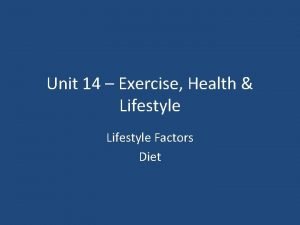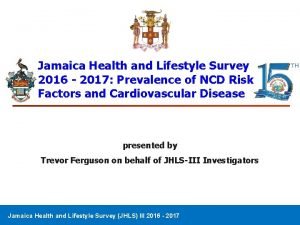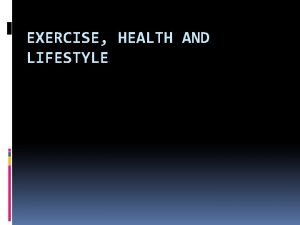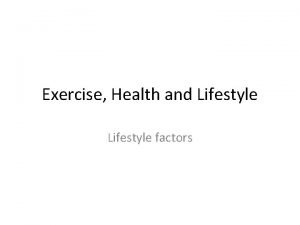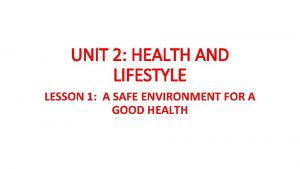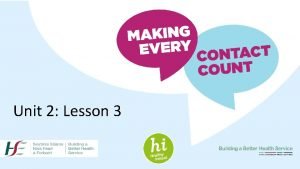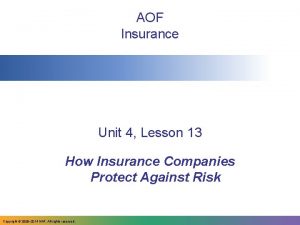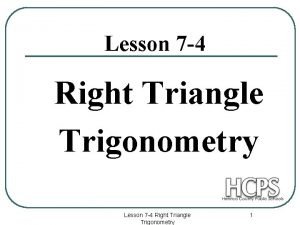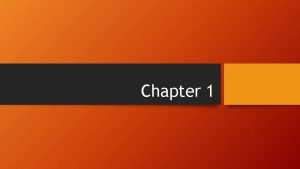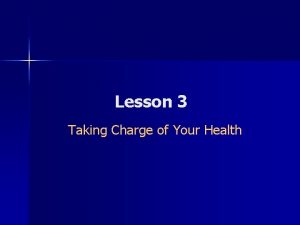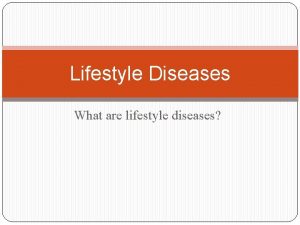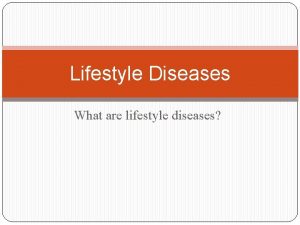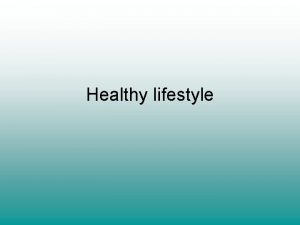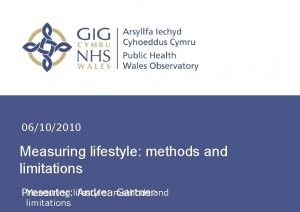UNIT 2 HEALTH AND LIFESTYLE LESSON 1 A










- Slides: 10

UNIT 2: HEALTH AND LIFESTYLE LESSON 1: A SAFE ENVIRONMENT FOR A GOOD HEALTH

LEAD IN ACTIVITY

LEARNING CONTEXT The 2 nd C 9 students of LMSEG youpougon are discussing to collect useful ideas to participate in a presentation competition organized by the English club on the impacts of living habits on people’s health

HEALTH SALIFU: Hello N’Dumi! How are you? N’DUMI: Hello Salifu! I’m not fine. I did not sleep well yesterday. SALIFU: What’s wrong with you? N’DUMI: I suffered from insomnia. In fact I’ve got a pain in my stomach, and I’ve got a terrible headache too. SALIFU: What did you eat yesterday? N’DUMI: I ate some fruits and I was very hungry and I forgot to wash them before eating. SALIFU: It may be indigestion because you did not take all the hygienic measures before eating. N’DUMI: You’re probably right. But is there a link with my headache? SALIFU: Well, I think that you are suffering from malaria because you have poor personal hygiene. Your house is surrounded by dirty water and dustbins which lead to proliferation of mosquitoes. You must take care of your environment. And you must go to see a doctor. N’DUMI: O. K. thank you for your advice. I’m going to the hospital.

VOCABULARY INPUT • Pain: a symptom of some physical hurt • Suffer from: to have an illness or health problem • Headache: a pain in your head • Malaria: an infected disease transmitted by an anopheles mosquito • Dirty: not clean • Dustbin: a large container where you put waste • Take care of: look after someone or something

GRAMMAR INPUT What’s wrong with Ericka? →She has got/ She’s got a headache → She is suffering from a headache

ACTIVITY 1: the words in column A are from the dialogue. Match each of them with its synonym or definition in column B. EXAMPLE: 1 f COLUMN A 1. Suffer from 2. Pain 3. Headache 4. Malaria 5. Dirty 6. Dustbin 7. Take care of COLUMN B a. garbage b. a disease caused by mosquitoes c. not clean d. a pain in a head e. look after f. have a health problem g. ache, hurt ANSWER 1 -f 2 -………………… 3 -………………… 4 -………………… 5 -………………… 6 -………………… 7 -…………………

ACTIVITY 2: ASK AND ANSWER QUESTIONS • What ‘s wrong with Jonathan? →Jonathan…………………… • What’s wrong with Sally? → Sally……………………………. • What’s wrong with Rayann? → Rayann……………………… • What’s wrong with Affiba? → Affiba…………………………. . • What’s wrong with Sombie? → Sombie………………………

COMMUNICATIVE ACTIVITY The English Club of your school is organizing a presentation competition on the impacts of the living conditions on people’s health. In groups of 5 or 6: • Mention people’s bad living conditions, the health problems caused by these conditions. • Suggest solutions for better living conditions. • Choose a spokesperson to present your work before the class. NB: The following words and expressions could help you: Dirty places – eating without washing hands – drinking from the river – stagnant water – not sleeping under mosquito nets Malaria – typhoid fever – diarrhoea – headache – indigestion Clean your environment – washing hands before eating – drinking clean water

HOMEWORK Fill in the gaps using the present perfect simple. 1. We have ………………for 5 years (learn). 2. Loane …………………. in the rain for 4 hours (work). 3. The telephone ………………. for 2 minutes. Why don’t you answer it (ring)? 4. I ………………in English to a native speaker before (never/speak).
 Exercise health and lifestyle
Exercise health and lifestyle Jamaica health and lifestyle survey 2019
Jamaica health and lifestyle survey 2019 Exercise health and lifestyle
Exercise health and lifestyle Exercise health and lifestyle
Exercise health and lifestyle Unit 1 lifestyle
Unit 1 lifestyle Unit 2 lifestyle
Unit 2 lifestyle Unit 2 lesson 3 health insurance and financial planning
Unit 2 lesson 3 health insurance and financial planning Unit 2 lesson 3 health insurance and financial planning
Unit 2 lesson 3 health insurance and financial planning Hyp opp adj
Hyp opp adj What is an overall state of well-being or total health
What is an overall state of well-being or total health Lesson 3 taking responsibility for your health
Lesson 3 taking responsibility for your health
